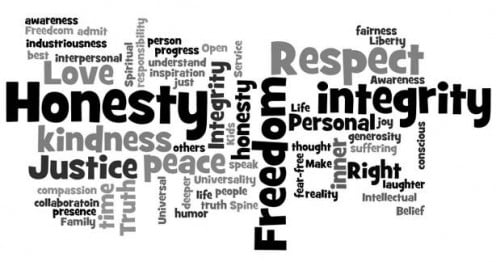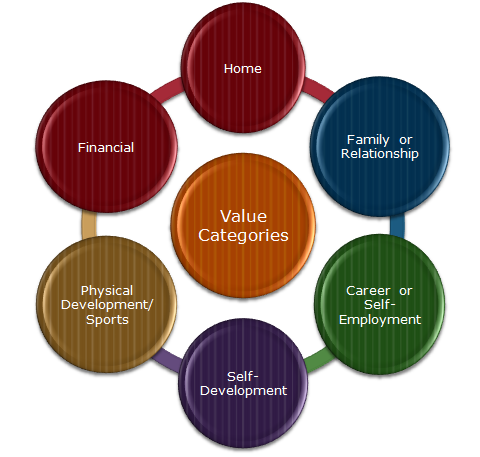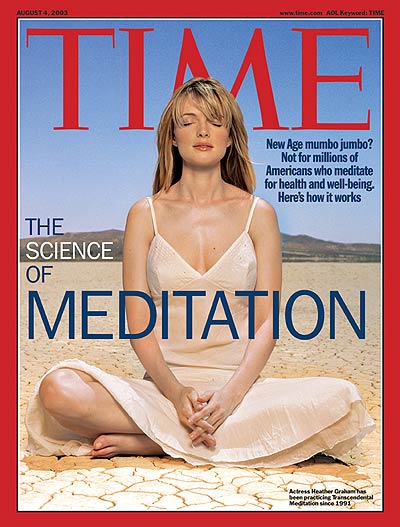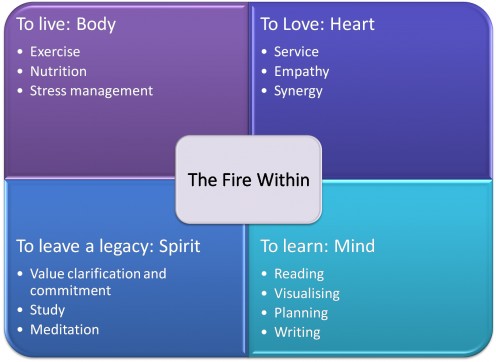How to Achieve Personal Growth and Balance V - the life of the spirit
To leave a legacy
“Personal leadership is the process of keeping your vision and values before you and aligning your life to be congruent with them.” – Stephen Covey, American leadership consultant and writer
“Try not to become a man of success but rather try to become a man of value.” – Albert Einstein 1879-1955, German-born brilliant American theoretical physicist
What do we want to leave our children and their children? What would we like them to think of us after we have gone? We are back to those questions again. Of course, each person has to answer these questions for themselves. I’m suggesting that it takes courage and insight into oneself to answer the questions with honesty and meaning. How to get such insight and honesty will be up to each individual and I think that there are three things that can help in this regard: values clarification, study and meditation.


Understanding our values
All our behaviour is driven by our values. From moment to moment life calls on us to make choices, and we make these choices on the basis of what we value, what things we hold dear, what we regard as truly important in our lives. When we choose to do “this” instead of “that,” it’s because we think “this” will be more in tune with what we value than “that” would.
The value of values clarification is that we begin to understand what we value and can start to make choices about our values, instead of our values being just accepted from outside sources – our parents, our peers, society at large. This is the difference between chosen values and introjected values. A person who lives by chosen values is likely to be more fulfilled than one who lives by introjected values. Living by introjected values often means going along to get along – just following the herd. The problem with this is that the herd will often take you to a place where you suddenly discover you don’t want to be, but now it’s too late to escape.
This is not to say that “anything goes,” however. As in all areas of human life, there are limits to the individual’s freedom – my freedom, in a sense, ends where it comes into contact with your freedom. We find ourselves most alive, most fulfilled, in relation to other people, not in some solipsistic place where only what we want is real. Such a place would turn out to be a dry and dusty desert, where we would eventually long for the refreshment of human contact – real, intimate contact. So we have to negotiate the limits our freedoms together, to come to agreement about the limits, without giving up what is right for us individually. A tough process, but one which will give meaning and excitement to life.
The importance of choice is highlighted by Covey as Habit 1: Be proactive. He cites the discovery of Victor Frankl that between stimulus and response, man has the freedom to choose: “Within the freedom to choose are those endowments that make us uniquely human.” These endowments, according to Covey, are self-awareness, imagination, conscience and independent will. “Between stimulus and response is our greatest power – the freedom to choose.” Says Covey.
Carl Rogers, the great humanistic psychologist, put is this way: “Man has within him an organismic basis for valuing. To the extent that he can be freely in touch with this valuing process in himself, he will behave in ways which are self-enhancing.”
And later in the same article, he states: “... such openness to experience leads to emerging value directions with appear to be common across individuals and perhaps even across cultures. ...individuals who are thus in touch with their experiencing come to value such directions as sincerity, independence, self-direction, self-knowledge, social responsivity, social responsibility, and loving interpersonal relationships.”

Study
By study I am not meaning only the common meaning of studying for an academic or technical qualification, important as those are. By study I mean getting deeper into anything that interests you – if you hear a piece of music that grabs you, find out who wrote it and what the circumstances were that led to it. If you enjoy a particular book, find out about the author, not just what other books he or she might have written, but where and how did they live, what were their interests. In other words, don’t just accept everything at face value but try to get underneath the surface.
I am often amazed when I find a person loves a particular piece of music but knows nothing more about it. Digging beneath the surface can enrich your mind and lead to ever greater understanding. An example – while writing this piece I came across the quotation on planning by E.B. White which I really enjoyed. I wanted to know more about him so did the obvious – I Googled his name and came up with the fact that he had written the books Charlotte’s Web and Stuart Little. Now my daughter has long been fascinated by the movies of these books but I had not realised that they were based on books by the same author. Now I am enjoying other writings by him.
Study is being open to experience and looking deeper into it. Being ready to explore wherever life leads. Being humble in the face of experience, not being dogmatic or looking for answers, but being ready to enjoy the process of learning. Answers tend to close down enquiry – living in the process opens up possibilities that you cannot imagine when looking for answers.

Meditation
“Meditation, through its ability to help us navigate the mind, restores that ability of inner listening, allowing us to make the best choices.” – Joan Borysenko, author of Minding the Body, Mending the Mind (1987).
One of the greatest ways to get to know yourself and how your mind works is to meditate. Meditation also has benefits in physical and spiritual states. Some of the benefits of regular meditation are stress reduction, strengthening of the body's immune system, better organized thought processes, improved powers of concentration, enhanced powers of memory, refinement and enlivening of the nervous system, awakening of regenerative energies, slowing of biologic aging processes, development of the capacities of the brain to process perceptions and states of consciousness, and orderly functioning of the body's organs, glands, and systems, according to the Centre for Spiritual Awareness, a Centre established by a Yogananda follower Roy Eugene Davis.
I was first alerted to the benefits of meditation by reading the book by Joan Borysenko, Minding the Body, Mending the Mind back in 1991 and I have been learning more about it ever since.
"We meditate to discover our own identity, our right place in the scheme of the universe. Through meditation, we acquire and eventually acknowledge our connection to an inner power source that has the ability to transform our outer world. In other words, meditation gives us not only the light of insight but also the power for expansive change." - from Julia Cameron, The Artist's Way (Pan, 1995)
Reading on
This Hub is part of a five-part series on balance and growth.
The other four Hubs can be found here:

- How to Achieve Personal Growth and Balance I - the fire within
A look at what contributes to personal growth and balance on our journey through life. This Hub is the first of a five-part series that looks a some personal growth books and techniques that can help us on our path of self-improvement - How to Achieve Personal Growth and Balance II - living in our bodies
Part two of a five-part series on achieving balance and personal growth - How to Achieve Personal Growth and Balance III - the life of the mind
Part Three of a five-part series on Personal Growth. Looking at growing the life of the mind through reading, visualising, planning and writing - How to Achieve Personal Growth and Balance IV - expanding the heart
This is the fourth part of a five-part series on how to achieve growth with balance in one's personal life. This part focuses on the heart, the capacity to love and empathise, the social nature of human beings. The factors of service, empathy and syn
Copyright Notice
The text and all images on this page, unless otherwise indicated, are by Tony McGregor who hereby asserts his copyright on the material. Should you wish to use any of the text or images feel free to do so with proper attribution and, if possible, a link back to this page. Thank you.
© Tony McGregor 2010



